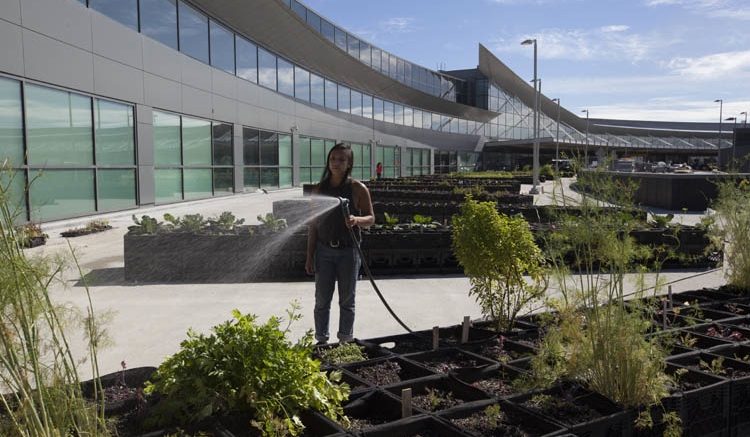What do you get when you combine an airline that wants to be more environmentally responsible, a food manufacturer that’s on board (pun totally intended), and a really creative idea?
The world’s first blue potato farm at an airport, of course.
It looks like this:

All photos courtesy of JetBlue.
Here’s the story of how the world’s first blue potato farm at an airport came to be.
JetBlue Airways, headquartered in New York, has always offered its passengers free bags of Terra Blues, which are potato chips made from blue potatoes (yep, the name is pretty self-explanatory). And passengers seem to enjoy them; last year, they ate almost 6 million bags of them while flying with JetBlue.
Inspired by Terra Blues, someone from JetBlue had the idea to try out a “farm-to-air” experiment. With the help of GrowNYC Partners and the Port Authority of New York and New Jersey, JetBlue and Terra made farming potatoes at an airport an actual thing. They launched the farm project earlier this month.
The farm takes up 24,000 square feet and includes 3,000 crates of potato plants, herbs, and other produce.
“It will highlight local farmers and New York’s agriculture and is expected to grow more than 1,000 pounds of blue potatoes per harvest, as well as house 2,000 herbs and plants including a variety of produce such as arugula, beets, mint and basil. It is the first blue potato farm in the world at an airport. In collaboration with the Port Authority of New York and New Jersey, the other plants being grown on the T5 Farm were carefully selected to deter bird and other wildlife coming to the area.”

The airline intends to use the herbs and produce it grows at this new farm in restaurants at JetBlue’s airport terminal, and they are working on finding a way to use the potatoes in the actual Terra Blues they offer passengers. Perhaps the best part: JetBlue will donate some of the food grown at the airport farm to local food pantries, too.
Sure, this isn’t some gigantic farm that’s going to supply all the food the airline serves, but can you imagine what a difference it would make if lots of companies started something like this? It’s a small but important step toward responsible food sourcing!
Originally posted at upworthy.com

